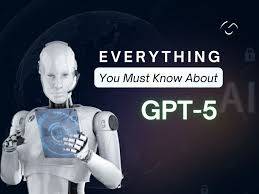GPT-5: What We Know So Far About OpenAI’s Next Big Leap (And Why It Feels a Little Personal)
I was halfway through my second cup of instant coffee—one of those mornings where the world feels like a blurry loading screen—when I saw the headline: “GPT-5 is coming.” And not in a speculative, maybe-next-year kind of way. Like, really coming. My first reaction? A weird mix of excitement and... hesitation.
Because honestly, I still remember the first time I used ChatGPT (back when GPT-3.5 was the big deal). I was writing a speech for my cousin’s wedding and I’d completely blanked out. One desperate Google search later, I was talking to an AI like it was my therapist, my editor, and my last-minute savior. And it worked. Better than I expected. Too well, almost.
So hearing about GPT-5? Yeah. It hits different.
So, what exactly is GPT-5?
From what’s floating around (and let’s be real—OpenAI isn’t exactly spilling all the beans), GPT-5 is poised to be the next major upgrade in how we interact with machines. Bigger training data. Smarter responses. Better memory. Probably fewer hallucinations (but no promises, right?).
The way it’s being described—by those who’ve allegedly seen early versions or talked to insiders—it’s not just another update. It’s a whole new level. Some are calling it the most humanlike model yet. Not just “AI that writes well,” but “AI that thinks with you.”
I don’t know about you, but that sentence sends a chill down my spine and makes me want to high-five a robot all at the same time.
Here's what we (kinda, sorta) know so far:
- Improved long-term memory. Meaning: It might actually remember things from one conversation to the next. (No more repeating your favorite pizza topping every time.)
- Better context understanding. Like, understanding you—your tone, your quirks, maybe even your vibe if that’s a thing.
- More creative reasoning. Think brainstorming ideas, solving real-world problems, and maybe even writing poetry that doesn’t sound like a 10th grader’s homework.
- Multi-modal from the start. Text, image, maybe video too? It could respond across formats more smoothly than ever.
Now, I haven’t gotten my hands on it yet (believe me, I’ve tried pulling strings), but the murmurs from tech insiders sound legit. Some folks even say GPT-5 could pass as human in a blind test more convincingly than anything before it.
(Which makes me think… what happens when I can’t tell if the “person” I’m arguing with on X at 2am is a real human or just a really passionate GPT? 😬)
But here’s where it gets real…
All this progress is cool—no doubt. But I can’t lie: there’s a part of me that feels weird about it too. Not scared exactly. Just… reflective.
I think about jobs—especially creative ones. I think about students turning in AI-written essays, or customer service chats that feel warm and human until you realize you’ve been venting to a machine. I think about what happens when GPT-5 starts writing better than me on a bad day. (Okay, maybe even on a good one.)
And it’s not about being anti-tech. Far from it. I love this stuff. But loving it also means asking hard questions. Like:
- Where do we draw the line between tool and replacement?
- What happens to trust when we can't always tell what's human-made?
- And are we ready—really ready—for a world where AI doesn't just assist us, but actively participates in our thoughts, decisions, and even relationships?
I don’t have answers. But I do have a gut feeling that we’re entering a new phase. One that feels a bit like handing the steering wheel to someone else—someone who might drive better than you, but still doesn’t quite know where you’re going.
Final thought (because this isn’t the end)
Maybe the real question isn’t whether GPT-5 is smarter than us, or more helpful, or even more humanlike.
Maybe the question is: How do we stay human, when machines start feeling human too?
Because the future’s not coming. It’s already typing.
And honestly? I’m excited. Nervous. Curious. All of it.
So yeah—maybe next time you’re sipping coffee and chatting with a bot, ask yourself: Who’s really doing the thinking here?
Have you ever had a conversation with AI that surprised you—scared you, even? Drop it in the comments or DM me. I’m genuinely curious how this next chapter feels for you too.



